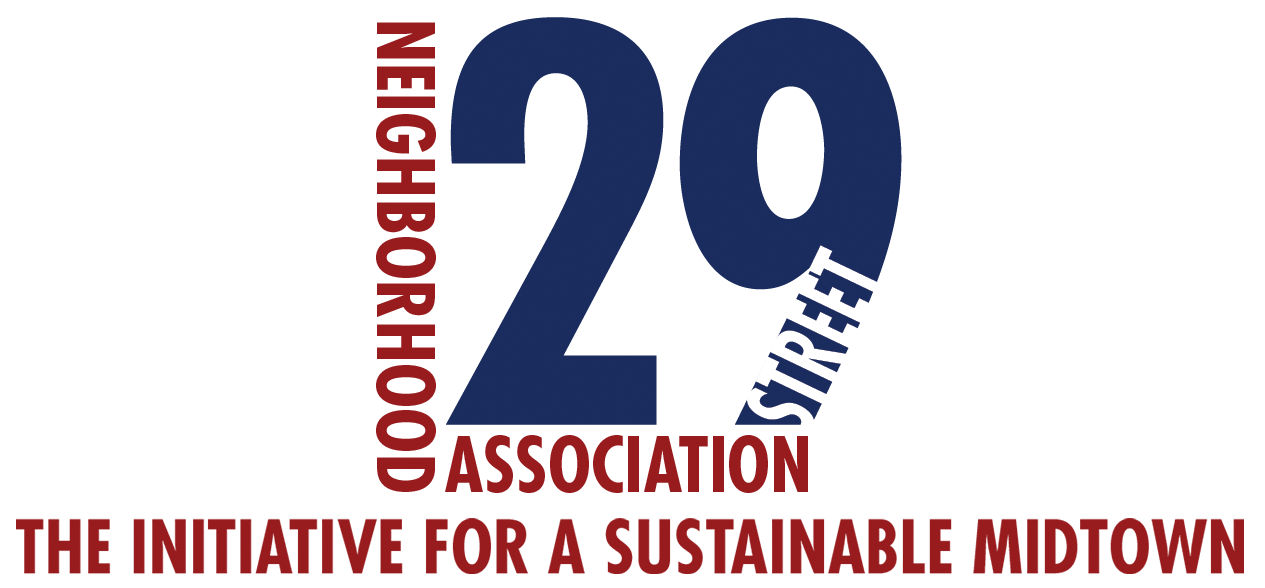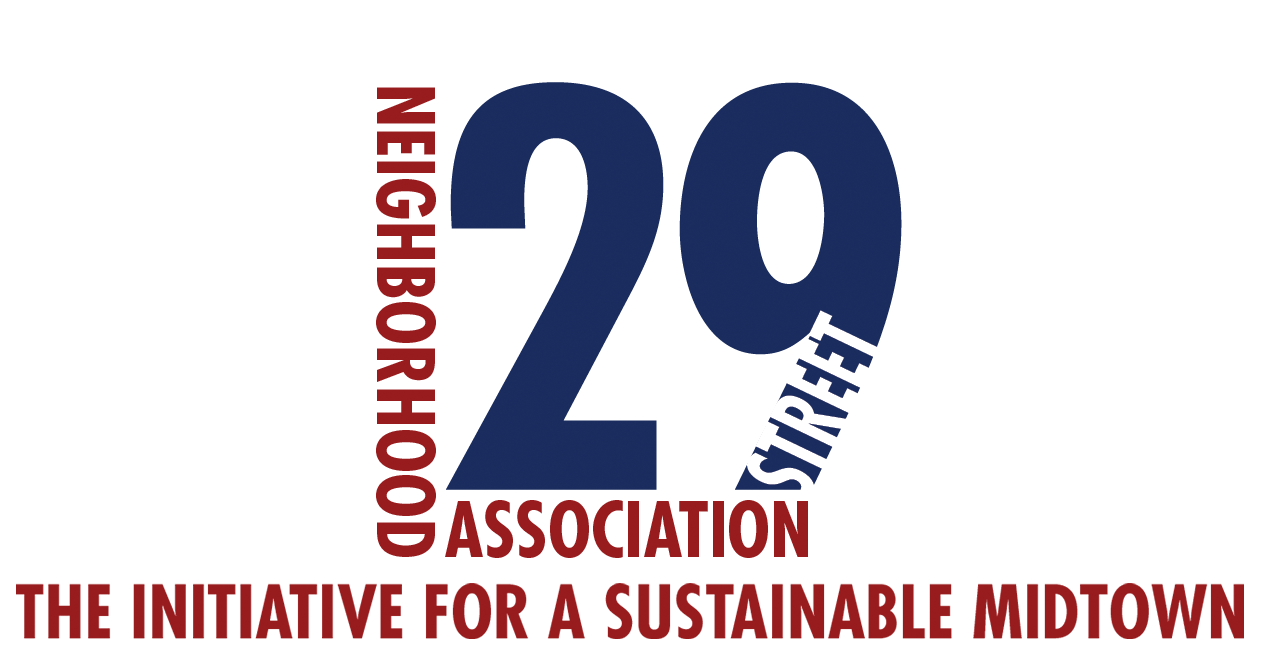Traffic Congestion:
The Association is currently working with the 13th Police Precinct, CB5, DOT, to find solutions to traffic congestion causing honking, especially at night in the following areas:
Park Avenue South from 30th to 28th Street
29th Street from Lexington to 7th Avenue
Noise Issues:
If noise from a bar or restaurant is an issue, here are some simple steps you can take to remedy the problem. They are easy, non-confrontational and usually work in addressing the issue.
1) Collect and organize your facts, especially noting:
Times of noise
How often
What type of noise (music (recorded or live), talking, shouting. Is it from within the establishment or outside? If outside, is it from traffic jams and departing patrons on the sidewalk at closing time, or from crowds gathering to smoke?
If you've been calling 311, keep a record of the complaint numbers. These are a paper trail that can show a history of complaints against an establishment.
Keep a "noise" diary
2) Does your issue violate city codes? How? Take notes.
3) Note hours of operation for business violating noise laws.
Does it have late closing hours? These are listed on a posting inside the establishment along with the number for occupancy (crowd size). Are they breaking either of these regulations?
Again, take notes.
4) Buy a decibel (sound level) meter and use it. Record noise levels to document the decibel level when the establishment is noisy and when it isn't. You can buy a decibel meter at Radio Shack or, if you have an iPhone, there are apps you can buy. Neither one is expensive.
5) Talk to the manager of the establishment.
Try to have a positive constructive tone and explain the facts about the problem, levels of noise and when it is occurring.
Offer to meet in person and take your organized notes with you. Be open to and suggest remedies (i.e. signage asking for patrons to be quieter, education of staff in enforcement of closing hours and keeping noise levels down, an employee to check the sidewalk periodically for noisy smokers, etc.)
6) If there is no satisfaction from the manager, take your facts and present them to the next Community Council Meeting of your precinct. These meetings are held regularly, usually once a month, and serve to let the police know about problematic situations in the precinct.
7) Request that a Community affairs officer at your precinct mediate in a meeting with the business, and suggest to the business that you are open to mediation.
8) If all of this fails to remedy the situation, contact the PSQL (Public Safety and Quality of Life) Committee of your Community Board. When does the liquor license for this establishment expire? Are there any stipulations that the business has agreed to follow under the terms of their current liquor license? If not, ask and attend the liquor license meeting for this business when it comes up for renewal. The committee wants to know if the establishment is a persistent violator and will insert stipulations as part of their renewal recommendations to the State Liquor Authority.
For more information on advanced, complex issues, we may be able to advise you further.
Contact us at adm@29streetassociation.org and we can see if we can be of assistance.
Liquor License Issues
The more informed you are on the problematic establishment and laws pertaining to liquor licenses, the more effective you can be in getting help to resolve any issues.
1) Determine liquor license status:
Active or inactive? If active, when does the license expire?
License type: on-premises, wine bar or hotel?
Is the license for a bar or restaurant?
License location: interior space, rooftop bar or rear yard bar?
How many liquor licenses are assigned to the address?
See "Important How-to Information" at the bottom for how to obtain this information from the Sate Liquor Authority.
2) Determine density of liquor licenses in the immediate area.
This is something that you should know as the State Liquor Authority has rules that can be considered in granting liquor licenses.
How many establishments hold active liquor licenses within 500 feet of primary business of interest?
How many establishments hold active liquor licenses on the same block?
3) Noise issues
Are there noise problems inside or outside the business?
If yes, please refer to our “Noise Issues: Resolving the Problem” steps for noise complaints, above
4) Check for CB5 stipulations and resolutions.
Most businesses first present their liquor license application to the PSQL (Public Safety and Quality of Life) Committee of the Community Board, which reviews the application, and may ask the applicants to appear before the committee for a public hearing. Depending on several factors, the committee may ask for stipulations as a condition of their positive recommendation to the State Liquor Authority to grant them a license. The applicant in exchange, agrees to abide by those stipulations. When attending a PSQL hearing, keep notes on any stipulations (hours of operation, noise agreements, etc.) and note if the business is violating those stipulations. Stipulations for liquor licenses are not currently posted on line by Community Board 5, however, you may contact CB5 and request the information. Regardless of whether there are stipulations, every hearing at PSQL will result in a resolution which will be posted on the CB5 (see below)
5) Register a complaint with Community Board 5
File complaints about potential violations of liquor licenses to CB5. The Public Safety and Quality of Life Committee (PSQ&L) holds public hearings on new and proposed renewals of liquor license applications of interest to the community. CB5's PSQ&L Committee and full board resolutions are submitted to the NYSLA for consideration. The NYSLA makes the final decision, but special consideration is made when granting renewals to problematic venues.
Helpful information for Community Board 5:
• email CB5's office: office@cb5.org
• Liquor license applications sorted by month
• Calendar for public hearings on liquor licenses: http://www.cb5.org/cb5/calendar/
6) Register a Compliant with the New York State Liquor Authority
If you would like to make a complaint about an establishment or have questions on enforcement issues, here is useful information:
• Online complaint form
• File complaints by phone: call 518-474-3114 and select option 2.
7) Ask for NYPD Action:
Is there underage drinking, sidewalk loitering and/or traffic congestion? These problems may be reported to NYPD for enforcement via 311 or (the best way) by attending a monthly NYPD community council meeting for your precinct and asking for help on the issue. They are very responsive to community input. Keep records with complaint numbers from and calls to 311, and please report results to CB5. Be sure to follow up with your local precinct as well through attending meetings regularly or contacting the Community Affairs Officer.
Important how-to information:
Conducting a New York State Liquor Authority – Public Query Search
1) Go to: https://www.sla.ny.gov, This is the home page of the NY State Liquor Authority
Click on “Public” on the left side menu:
You will see 5 choices under “Public License Query”:
Search by License Number
Search by Premises or Trade Name
Search by Premises Location
Search by Name of Principal
Advanced Query
Searching by trade name, location, or principal is often frustrating, since you must have the exact same wording as the license listing, and information is entered into the system in many ways (for example, Avenue or Ave, W. or West, etc in the address; the Gansevoot Hotel is listed as “TGA II LLC and 29 PARK LLC as Manager” and also under another license as “ONE PARK LLC”).
If you cannot find the license information by name, location, or by principal, try “Advanced Query”.
In Advanced Query, you can search by zip code. You will get a long list of all licenses in that zip code, which you can look through to find the license information. It's tedious, but sometimes quicker than trying to guess which abbreviations were used in any one entry. (Manhattan is New York County). The advanced query can also be downloaded into excel format, which might make sifting through the info a little easier.
Click on “premises name” for license details.
Building's address in SLA's records may be different from the business's visible street address. Example: A bar with an entrance near a street corner may have an address in SLA's records that is different from the entrance to the business.
2) Confirm address of the property for the liquor license:
Department of Buildings: https://www1.nyc.gov/site/buildings/index.page



